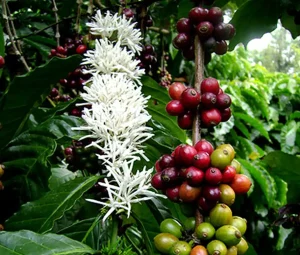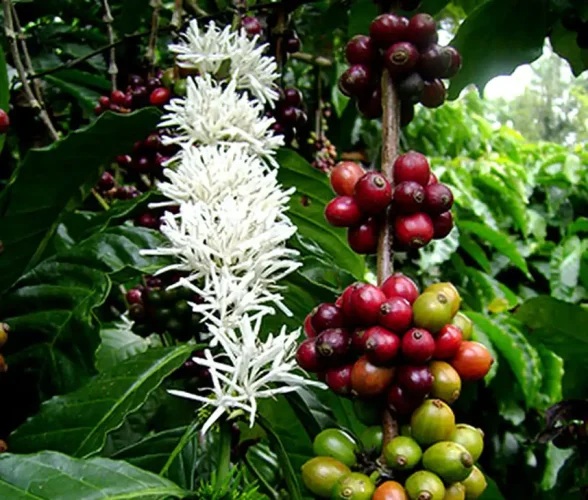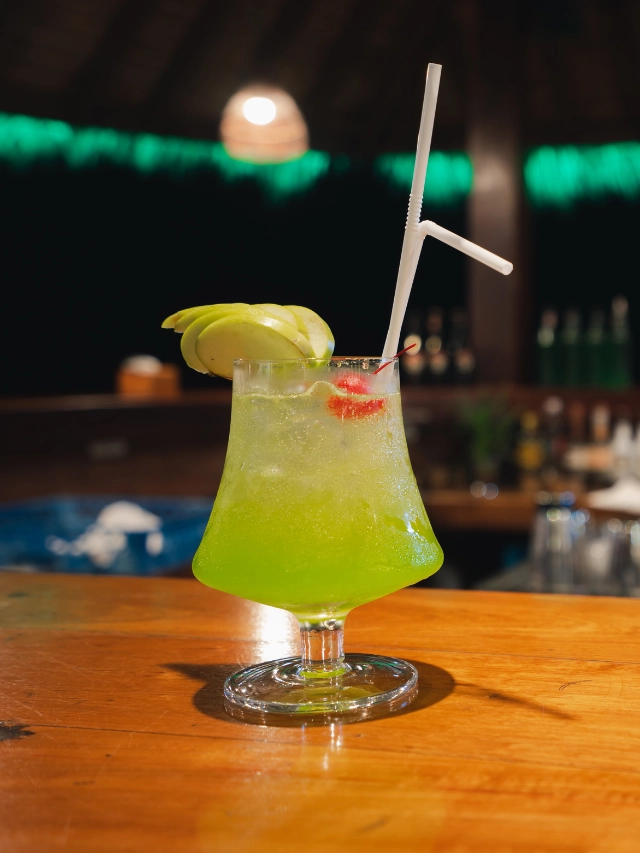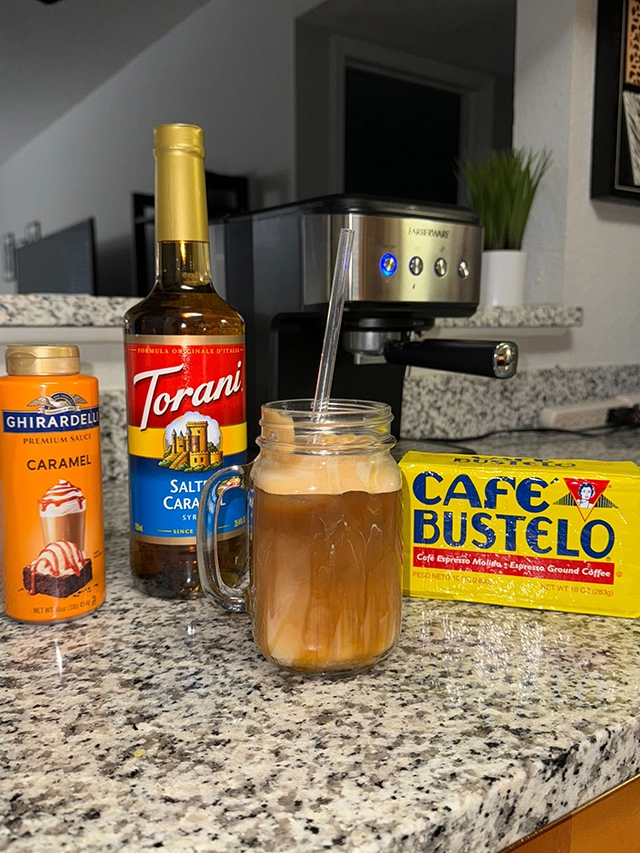The Elegance of Arabica Coffee

Arabica coffee, known for its rich and nuanced flavors, is a gourmet delight that traces its origins to the highlands of Ethiopia. With a history spanning centuries, this coffee variety has earned its reputation as one of the world's finest. Arabica beans are celebrated for their mild, less bitter taste and diverse flavor notes, ranging from floral and fruity to nutty and chocolatey. Cultivated at higher altitudes in regions like Colombia, Ethiopia, Brazil, and Kenya, Arabica coffee continues to captivate coffee enthusiasts with its exceptional quality and commitment to sustainability.
Type: Beverage and Drinks
Cuisine: Coffee
Keywords: Coffee, Arabica Coffee
Recipe Yield: 2 servings
Calories: 5 calories
Preparation Time: PT5M
Cooking Time: PT5M
Total Time: PT10M
Recipe Video Name: How To Make The Best Arabic Coffee At Home
Recipe Video Description: Have you ever experienced the delight of trying Arabic Coffee, also known as qahwa? It's a luscious and aromatic brew that truly highlights the rich flavors of the coffee beans. Coffee has been a cherished beverage in the Middle East since the 15th century, and its traditional preparation has remained largely unchanged to this day. In this guide, I'll take you through the ingredients used to make Arabic coffee and how to prepare this exquisite qahwa.
Recipe Video Thumbnail: https://www.youtube.com/watch?v=kfxX-79sVjQ
Recipe Ingredients:
- Arabica coffee beans (freshly ground)
- Fresh, cold water
- Coffee maker or French press
- Filter (if using a coffee maker)
Recipe Instructions:
Arabica Coffee:
- Measure the Coffee: The ideal coffee-to-water ratio for Arabica coffee is typically 1 to 2 tablespoons of coffee grounds for every 6 ounces of water. Adjust this ratio to your taste preference. Boil Water: Start by heating fresh, cold water. It's essential to use good-quality water, as it makes up the majority of your coffee. Avoid using tap water with strong flavors or impurities. Grind Coffee Beans: If you have whole Arabica coffee beans, grind them to a medium-coarse consistency, resembling breadcrumbs. The grind size is crucial to control the extraction process and flavor. Prepare Your Coffee Maker or French Press: For a Drip Coffee Maker: Place a coffee filter in the basket, add the measured coffee grounds, and close the lid. For a French Press: Add the coffee grounds to the bottom of the press. Add Hot Water: Once the water reaches the ideal temperature, which is around 195-205°F (90-96°C), pour it evenly over the coffee grounds. In a drip coffee maker, use the water reservoir. In a French press, simply pour the hot water over the coffee grounds. Brew Time: Allow the coffee to steep for about 4-5 minutes. This allows the water to extract the flavors from the coffee grounds. For a French press, place the lid on with the plunger up but do not press down. For a drip coffee maker, it will automatically brew for the set time. Plunge and Serve (For French Press): After steeping, slowly press down the plunger of the French press to separate the coffee grounds from the liquid. This will leave you with a rich, full-bodied Arabica coffee. Serve: Pour the freshly brewed Arabica coffee into your favorite coffee mug or cup. You can enjoy it black or customize it with sugar, cream, or milk, depending on your preference. Enjoy: Sip and savor the delightful aroma and flavor of your Arabica coffee. Pair it with your favorite snacks or desserts for an even better experience. Remember that the quality of your coffee beans, water, and the grind size will greatly affect the taste of your Arabica coffee. Experiment to find the perfect combination that suits your palate.
The Elegance of Arabica Coffee

Arabica coffee, known for its rich and nuanced flavors, is a gourmet delight that traces its origins to the highlands of Ethiopia. With a history spanning centuries, this coffee variety has earned its reputation as one of the world's finest. Arabica beans are celebrated for their mild, less bitter taste and diverse flavor notes, ranging from floral and fruity to nutty and chocolatey. Cultivated at higher altitudes in regions like Colombia, Ethiopia, Brazil, and Kenya, Arabica coffee continues to captivate coffee enthusiasts with its exceptional quality and commitment to sustainability.
Type: Beverage and Drinks
Cuisine: Coffee
Keywords: Coffee, Arabica Coffee
Recipe Yield: 2 servings
Calories: 5 calories
Preparation Time: PT5M
Cooking Time: PT5M
Total Time: PT10M
Recipe Video Name: How To Make The Best Arabic Coffee At Home
Recipe Video Description: Have you ever experienced the delight of trying Arabic Coffee, also known as qahwa? It's a luscious and aromatic brew that truly highlights the rich flavors of the coffee beans. Coffee has been a cherished beverage in the Middle East since the 15th century, and its traditional preparation has remained largely unchanged to this day. In this guide, I'll take you through the ingredients used to make Arabic coffee and how to prepare this exquisite qahwa.
Recipe Video Thumbnail: https://www.youtube.com/watch?v=kfxX-79sVjQ
Recipe Ingredients:
- Arabica coffee beans (freshly ground)
- Fresh, cold water
- Coffee maker or French press
- Filter (if using a coffee maker)
Recipe Instructions:
Arabica Coffee:
- Measure the Coffee: The ideal coffee-to-water ratio for Arabica coffee is typically 1 to 2 tablespoons of coffee grounds for every 6 ounces of water. Adjust this ratio to your taste preference. Boil Water: Start by heating fresh, cold water. It's essential to use good-quality water, as it makes up the majority of your coffee. Avoid using tap water with strong flavors or impurities. Grind Coffee Beans: If you have whole Arabica coffee beans, grind them to a medium-coarse consistency, resembling breadcrumbs. The grind size is crucial to control the extraction process and flavor. Prepare Your Coffee Maker or French Press: For a Drip Coffee Maker: Place a coffee filter in the basket, add the measured coffee grounds, and close the lid. For a French Press: Add the coffee grounds to the bottom of the press. Add Hot Water: Once the water reaches the ideal temperature, which is around 195-205°F (90-96°C), pour it evenly over the coffee grounds. In a drip coffee maker, use the water reservoir. In a French press, simply pour the hot water over the coffee grounds. Brew Time: Allow the coffee to steep for about 4-5 minutes. This allows the water to extract the flavors from the coffee grounds. For a French press, place the lid on with the plunger up but do not press down. For a drip coffee maker, it will automatically brew for the set time. Plunge and Serve (For French Press): After steeping, slowly press down the plunger of the French press to separate the coffee grounds from the liquid. This will leave you with a rich, full-bodied Arabica coffee. Serve: Pour the freshly brewed Arabica coffee into your favorite coffee mug or cup. You can enjoy it black or customize it with sugar, cream, or milk, depending on your preference. Enjoy: Sip and savor the delightful aroma and flavor of your Arabica coffee. Pair it with your favorite snacks or desserts for an even better experience. Remember that the quality of your coffee beans, water, and the grind size will greatly affect the taste of your Arabica coffee. Experiment to find the perfect combination that suits your palate.
The Elegance of Arabica Coffee

Arabica coffee, known for its rich and nuanced flavors, is a gourmet delight that traces its origins to the highlands of Ethiopia. With a history spanning centuries, this coffee variety has earned its reputation as one of the world's finest. Arabica beans are celebrated for their mild, less bitter taste and diverse flavor notes, ranging from floral and fruity to nutty and chocolatey. Cultivated at higher altitudes in regions like Colombia, Ethiopia, Brazil, and Kenya, Arabica coffee continues to captivate coffee enthusiasts with its exceptional quality and commitment to sustainability.
Type: Beverage and Drinks
Cuisine: Coffee
Keywords: Coffee, Arabica Coffee
Recipe Yield: 2 servings
Calories: 5 calories
Preparation Time: PT5M
Cooking Time: PT5M
Total Time: PT10M
Recipe Video Name: How To Make The Best Arabic Coffee At Home
Recipe Video Description: Have you ever experienced the delight of trying Arabic Coffee, also known as qahwa? It's a luscious and aromatic brew that truly highlights the rich flavors of the coffee beans. Coffee has been a cherished beverage in the Middle East since the 15th century, and its traditional preparation has remained largely unchanged to this day. In this guide, I'll take you through the ingredients used to make Arabic coffee and how to prepare this exquisite qahwa.
Recipe Video Thumbnail: https://www.youtube.com/watch?v=kfxX-79sVjQ
Recipe Ingredients:
- Arabica coffee beans (freshly ground)
- Fresh, cold water
- Coffee maker or French press
- Filter (if using a coffee maker)
Recipe Instructions:
Arabica Coffee:
- Measure the Coffee: The ideal coffee-to-water ratio for Arabica coffee is typically 1 to 2 tablespoons of coffee grounds for every 6 ounces of water. Adjust this ratio to your taste preference. Boil Water: Start by heating fresh, cold water. It's essential to use good-quality water, as it makes up the majority of your coffee. Avoid using tap water with strong flavors or impurities. Grind Coffee Beans: If you have whole Arabica coffee beans, grind them to a medium-coarse consistency, resembling breadcrumbs. The grind size is crucial to control the extraction process and flavor. Prepare Your Coffee Maker or French Press: For a Drip Coffee Maker: Place a coffee filter in the basket, add the measured coffee grounds, and close the lid. For a French Press: Add the coffee grounds to the bottom of the press. Add Hot Water: Once the water reaches the ideal temperature, which is around 195-205°F (90-96°C), pour it evenly over the coffee grounds. In a drip coffee maker, use the water reservoir. In a French press, simply pour the hot water over the coffee grounds. Brew Time: Allow the coffee to steep for about 4-5 minutes. This allows the water to extract the flavors from the coffee grounds. For a French press, place the lid on with the plunger up but do not press down. For a drip coffee maker, it will automatically brew for the set time. Plunge and Serve (For French Press): After steeping, slowly press down the plunger of the French press to separate the coffee grounds from the liquid. This will leave you with a rich, full-bodied Arabica coffee. Serve: Pour the freshly brewed Arabica coffee into your favorite coffee mug or cup. You can enjoy it black or customize it with sugar, cream, or milk, depending on your preference. Enjoy: Sip and savor the delightful aroma and flavor of your Arabica coffee. Pair it with your favorite snacks or desserts for an even better experience. Remember that the quality of your coffee beans, water, and the grind size will greatly affect the taste of your Arabica coffee. Experiment to find the perfect combination that suits your palate.
Last Updated on March 28, 2025

Introduction to Arabica Coffee
Arabica Coffee: A Gourmet Delight
Arabica coffee, known scientifically as Coffea arabica, is one of the most cherished coffee varieties worldwide. Renowned for its exceptional flavor, Arabica coffee beans are considered the gold standard among coffee connoisseurs. In this article, we’ll delve into the fascinating world of Arabica coffee, exploring its origins, flavor profile, cultivation, and more.
Origins and History of Arabica Coffee
The Birthplace of Arabica Coffee
Arabica coffee has its roots in the high-altitude regions of Ethiopia, where it has been cultivated for centuries. Legend has it that a goat herder discovered the coffee bean’s stimulating properties when his goats became exceptionally energetic after consuming the berries. From Ethiopia, Arabica coffee spread to the Arabian Peninsula, hence its name, and eventually to other coffee-growing regions around the world.
Flavor Profile of Arabica Coffee
A Symphony of Flavor Notes
Arabica coffee is celebrated for its diverse and nuanced flavor profile. With a milder, less bitter taste compared to its robusta counterpart, Arabica beans offer a delightful sensory experience. The flavor notes of Arabica coffee can range from floral and fruity to nutty and chocolatey, with hints of acidity and sweetness, making it a favorite for those who appreciate a sophisticated coffee experience.
Cultivation and Growing Regions
Nurtured on Misty Mountains
Arabica coffee thrives at higher altitudes, typically between 2,000 to 6,000 feet above sea level. This elevation-dependent cultivation gives the beans their unique flavor. Regions like Colombia, Ethiopia, Brazil, and Kenya are renowned for their Arabica coffee production. The beans are often grown under the shade of trees, enhancing their distinct characteristics.
Heading 5: Challenges and Sustainability
Safeguarding Arabica Coffee’s Future
Arabica coffee faces various challenges, including climate change, pests, and diseases. Farmers and coffee producers are increasingly adopting sustainable practices and investing in quality control to ensure the future of Arabica coffee. Initiatives like shade-grown coffee and organic farming methods are helping preserve the delicate ecosystems that support this beloved coffee variety.
In conclusion, Arabica coffee represents a rich tapestry of history, flavor, and sustainability efforts. Whether you’re a casual coffee drinker or a dedicated enthusiast, Arabica coffee’s story and taste offer an inviting journey into the world of gourmet coffee.
Melon Sour Magic: Sip into Summer with this Refreshing Twist
Iced Caramel Macchiato: Indulge in Icy Sweetness at Home
Romantic Refresher: Red Raspberry Drink for Valentine’s Day Bliss
- The Ancient and Best Way to Brew Loose-Leaf Tea
- Iced Caramel Macchiato: Indulge in Icy Sweetness at Home
- Romantic Refresher: Red Raspberry Drink for Valentine’s Day Bliss
- Spice Up Your Night: Cinnamon Toast Crunch Shot Recipe for Party Perfection!
- Melon Sour Magic: Sip into Summer with this Refreshing Twist
- Successible Life Staff
- Successible Life Staff
- Successible Life Staff
- Successible Life Staff




